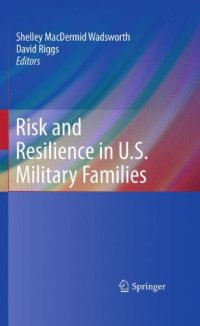
Ebook: Risk and Resilience in U.S. Military Families
- Genre: History // Military History
- Tags: Psychotherapy and Counseling
- Year: 2011
- Publisher: Springer-Verlag New York
- Edition: 1
- Language: English
- pdf
Among the costs of the ongoing wars in Afghanistan and Iraq are the human losses -- over 5,000 dead and over 35,000 wounded. Additionally, service personnel often return with traumatic brain injuries, missing limbs, and severe psychological disorders. All of this exacerbates the stress that family members have had to endure since initial deployment. Written by military and civilian scholars across the medical and mental health fields, Risk and Resilience in Military Families focuses on four key areas of research: marital functioning, parenting and child outcomes, family sequelae of wounds and injuries, and single service members (who comprise half of currently active troops). The results are up-to-date (and occasionally surprising) findings on psychological health issues affecting service members and their loved ones, and proven strategies for promoting family resilience, intervening to reduce dysfunctional behavior, and guiding families through the recovery process. Training issues and recommendations for further research round out this singular volume.
Included among the topics:
•Deployment: Risk or protective factor for couples? •A community program for “secretive problems” (e.g., drug abuse) in the military. •Interventions for the combat-injured family. •Trauma, PTSD, and partner violence. •The deployment experience for children of service members. •The single mother in the military.
An important text for researchers and academics in family and military studies, as well as for social workers, providers, and policymakers, Risk and Resilience in Military Families offers innovative coverage of a distinctive population and its unique needs.
War related separations challenge military families in many ways. The worry and uncertainty associated with absent family members exacerbates the challenges of personal, social, and economic resources on the home front. U.S. military operations in Iraq and Afghanistan have sent a million service personnel from the U.S. alone into conflict areas leaving millions of spouses, children and others in stressful circumstances. This is not a new situation for military families, but it has taken a toll of magnified proportions in recent times. In addition, medical advances have prolonged the life of those who might have died of injuries. As a result, more families are caring for those who have experienced amputation, traumatic brain injury, and profound psychological wounds. The Department of Defense has launched unprecedented efforts to support service members and families before, during, and after deployment in all locations of the country as well as in remote locations. Stress in U.S. Military Families brings together an interdisciplinary group of experts from the military to the medical to examine the issues of this critical problem. Its goal is to review the factors that contribute to stress in military families and to point toward strategies and policies that can help. Covering the major topics of parenting, marital functioning, and the stress of medical care, and including a special chapter on single service members, it serves as a comprehensive guide for those who will intervene in these problems and for those undertaking their research.